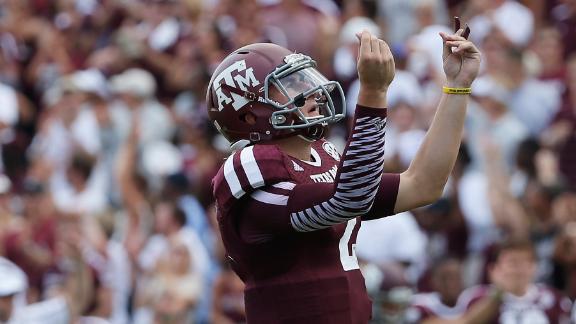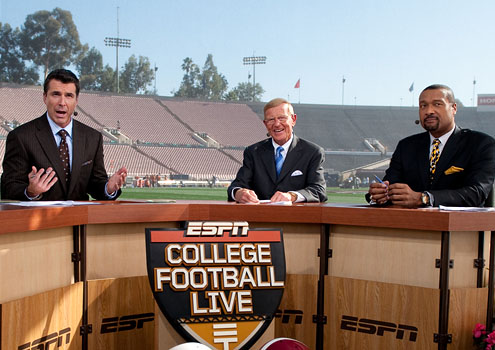Conflicted Coverage: ESPN and Johnny Manziel
“What’s good for ESPN is good for the game” ~ Rece Davis
 College football kicked off this weekend, and it should come as no surprise that one of the biggest stories surrounded Johnny Manziel. The Texas A&M quarterback rose to national prominence last year with a terrific season, winning the Heisman trophy, and garnering the nickname “Johnny Football.” Returning after a Heisman-season is enough to put one squarely in the media’s lens, but Manziel’s off-the-field summer activities made him a much bigger target.
College football kicked off this weekend, and it should come as no surprise that one of the biggest stories surrounded Johnny Manziel. The Texas A&M quarterback rose to national prominence last year with a terrific season, winning the Heisman trophy, and garnering the nickname “Johnny Football.” Returning after a Heisman-season is enough to put one squarely in the media’s lens, but Manziel’s off-the-field summer activities made him a much bigger target.
At the beginning of August, ESPN’s Outside the Lines reported the NCAA was investigating whether Manziel was paid for signing hundreds of autographs, citing two witnesses and multiple other sources. NCAA bylaw 12.5.2.1 states student-athletes cannot use their names or likenesses for commercial gain. More and more sources came forward, including an autograph broker claiming he paid Manziel $7,500. Finally, in late August just days before the season began, the NCAA revealed the results of their investigation: they found no evidence of Manziel receiving payment. However, Manziel would be suspend for the first half of Texas A&M’s opener against Rice this past Saturday for violating the ‘spirit’ of the rule. Many questioned the odd decision and the message it sent, some wondering if he got off too easy.
ESPN played up the controversy as they hyped the opening weekend. This promo video from ESPN writer Wright Thompson shows how the network presented Manziel as a superstar celebrity, emphasizing his off-field personality more than his athletic achievements:
After the game, ESPN got exactly what they wanted: not just a great athletic performance but fuel for the fire of Manziel’s cult of personality. Although Manziel had a great game, this was almost entirely overshadowed by his antics on the field, including autograph and money-based taunting and a personal foul for unsportsmanlike conduct. To be clear, this post is not interested in Manziel’s sportsmanship, eligibility, guilt, or otherwise. What is fascinating about this story is how it was reported and discussed on ESPN immediately afterward, and what that reveals about the nature of celebrity, sports, and media representation.
A quick game recap featured on both ESPN’s website and SportsCenter broadcasts introduced Manziel as the “biggest villain in college football.” When the recap reached the unsportsmanlike conduct call, the reporter said, “I suppose when you win the Heisman trophy, you can do things like that,” although he was quick to add, in a somewhat parodic manner, “but it’s just not becoming of a champion.” In other words the quick-style reporting of the incident did not question Manziel’s actions, and even went so far as to play up the antagonistic behavior.
This reporting is in contrast to several analysts’ takes on the situation, including one from Jesse Palmer calling Manziel’s antics “inexcusable.” After reiterating the ways in which Manziel is viewed as a villain (referencing Heisman jealousy and fraternizing with LeBron James), Palmer shifts focus to Manziel’s performance saying, “Now on the field, I love what Johnny Manziel did today.” Here we see the ways in which ESPN (and several fans) are attempting to both celebrate Manziel’s athletic accomplishments while acknowledging and criticizing his personal presentation.
However, a segment featuring two of the networks stalwart college football analysts, Mark May and Lou Holtz, alongside host Rece Davis pulled back the curtain on how ESPN decides to deal with Manziel as both athlete and celebrity. When discussing Manziel’s taunting, Davis claims, “One of the reasons we love Johnny on the field is because he’s flamboyant, he’s reckless, he takes chances… but there’s a line and he’s got to find that boundary and stay behind it.” When Davis says “we,” he might as well be saying “We here at ESPN,” as he is acknowledging the antics of Manziel are what makes him the celebrity figure he is; loved or hated, it gets a reaction from viewers and gives people a reason to watch ESPN.
After Davis continues to play Manziel’s advocate, claiming Manziel made these gestures last year, May and Holtz immediately argue that Manziel has indeed gone too far with Holtz saying, “I don’t think it’s good for the game… It think it’s good for ESPN, but I don’t think it’s good for the game.” Davis immediately responds by saying, “Well what’s good for ESPN is good for the game,” though he barely gets the last word out as he appears to realize what he is saying. In that brief, unfiltered moment, Rece Davis reveals exactly the position ESPN is in; they are a business who’s role is not to support ‘the game’ as an abstract concept, but to profit alongside the NCAA through stars like Johnny Manziel. (Student-athletes’ inability to make money off their own names/likenesses, of course, makes this problematic).
Rece Davis is absolutely right, from ESPN’s perspective, as Manziel’s antics will only drive more viewers to the screen. By creating the persona of Manziel as the villain or heel, ESPN can engage viewers on a more emotional level, giving people another reason to tune it. This is ESPN creating a narrative to further engage their audience. Just like Breaking Bad or professional wrestling, the desire to see justice prevail and villains punished pulls us in deeper and keeps us watching. They are stuck in the middle between glamorizing and promoting the natural celebrity of Manziel while at the same time criticizing the very actions which make him a celebrity in the first place. ESPN wants it both ways. When it comes to showmanship vs. sportsmanship, ESPN are enablers, wagging their finger with one hand and patting the back with the other. It becomes easy to forget that at the center of all of this is a 20 year-old kid from Tyler, Texas named Johnny.



